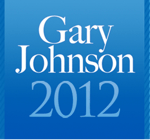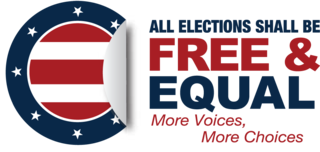Related Research Articles

The Libertarian Party (LP) is a political party in the United States that promotes civil liberties, non-interventionism, laissez-faire capitalism, and limiting the size and scope of government. The party was conceived in August 1971 at meetings in the home of David F. Nolan in Westminster, Colorado, and was officially formed on December 11, 1971, in Colorado Springs. The organizers of the party drew inspiration from the works and ideas of the prominent Austrian school economist, Murray Rothbard. The founding of the party was prompted in part due to concerns about the Nixon administration, the Vietnam War, conscription, and the introduction of fiat money.
Third party, or minor party, is a term used in the United States' two-party system for political parties other than the Republican and Democratic parties.
Ballot access are rules and procedures regulating the right to candidacy, the conditions under which a candidate, political party, or ballot measure is entitled to appear on voters' ballots in elections in the United States. The jurisprudence of the right to candidacy and right to create a political party are less clear than voting rights in the United States. However, the U.S. Supreme Court has established in multiple cases that the federal constitution does not recognize a fundamental right to candidacy, and that state governments have a legitimate government interest in blocking "frivolous or fraudulent candidacies". As election processes are decentralized by Article I, Section 4, of the United States Constitution, ballot access laws are established and enforced by the states. As a result, ballot access processes may vary from one state to another. State access requirements for candidates generally pertain to personal qualities of a candidate, such as: minimum age, residency, and citizenship. Additionally, many states require prospective candidates to collect a specified number of qualified voters' signatures on petitions of support and mandate the payment of filing fees before granting access; ballot measures are similarly regulated. Each state also regulates how political parties qualify for automatic ballot access, and how those minor parties that do not can. Fundamental to democracy, topics related to ballot access are the subject of considerable debate in the United States.
The Coalition for Free and Open Elections (COFOE) is a nonpartisan organization in the United States that aims to promote fair ballot access. COFOE was founded in 1985, when representatives from across the political spectrum met in the New York City law office of former U.S. Attorney General Ramsey Clark.
Ballot Access News is a United States-based website and monthly online and print newsletter edited and published by Bill Redpath and Richard Winger.

The Libertarian Party of Michigan is a Michigan state political party advocating a libertarian ideology and the state affiliate of the Libertarian Party of the United States. The party gained primary ballot access status in 2016 because of the vote total of presidential nominee Gary Johnson. The party lost their status since their 2018 gubernatorial nominee Bill Gelineau failed to reach that threshold in the general election.
Thomas Robert Stevens was an American lawyer, politician, and blogger. He founded the Objectivist Party and served as its chair. Stevens was that party's nominee for president in the 2008 and 2012 United States presidential elections. He was the founder of the Personal Freedom Party of New York. Additionally he was the president of the Beaux Arts Society, a position he cherished. With an interest in the arts, Dr. Stevens also was a play reviewer for Applause! Applause!.
This article contains lists of official third party and independent candidates associated with the 2012 United States presidential election.

Christina Tobin is an American activist and leader in the election reform and voters' rights movements. She is the founder and chair of The Free & Equal Elections Foundation, and president and chief executive officer of Free and Equal, Inc.
The 2012 Libertarian National Convention, in which delegates of the Libertarian Party (LP) chose the party's nominees for president and vice president in the 2012 general election, was held May 2–6, 2012, in Las Vegas, Nevada, at the Red Rock Resort Spa and Casino. Former Governor of New Mexico Gary Johnson won the presidential nomination on the first ballot. Retired California state court judge Jim Gray won the vice presidential nomination, also on the first ballot. The convention also chose to replace most of the Libertarian National Committee party officers and members-at-large.

The 2012 presidential campaign of Gary Johnson, the 29th governor of New Mexico, was announced on April 21, 2011. He declared his candidacy for the 2012 Republican Party nomination for President of the United States. On December 28, 2011, Johnson withdrew his candidacy for the Republican nomination, and declared his candidacy for the 2012 presidential nomination of the Libertarian Party. The 2012 Libertarian National Convention was held during the first weekend of May 2012. On May 5, 2012, after promoting his libertarian-oriented political positions to delegates, Johnson received the most votes at the convention and became the official 2012 Libertarian presidential nominee. On November 6, 2012, Johnson received just under 1% of the popular vote in the general election, amounting to more than 1.2 million votes, more than double what the Barr/Root ticket received in 2008. This was the most successful result for a third-party presidential candidacy since 2000, and the best in the Libertarian Party's history by vote number at the time. Johnson ran again in 2016 and received nearly four times his 2012 vote total.
This article contains lists of official and potential third party and independent candidates associated with the 2016 United States presidential election.

The Free & Equal Elections Foundation is a 501(c)(3) non-profit, non-partisan organization in the United States, the mission of which is to empower American voters through education and advocacy of electoral reforms. Free & Equal leads national, state, and local efforts to open the electoral process in the United States by hosting all-inclusive gubernatorial, Presidential, and senatorial debates; organizing Electoral Reform Symposiums; producing United We Stand tours; and supporting individuals running for office. Free & Equal was first organized in 1982 as the Foundation for Free Campaigns and Elections, before being formally reorganized in 2008 by Christina Tobin, an American activist and leader in the election reform and voters' rights movement.

Roque "Rocky" De La Fuente Guerra is an American businessman and politician. A perennial candidate, De La Fuente was the Reform Party nominee in the 2016 and 2020 United States presidential elections. He also appeared on his own American Delta Party's presidential ticket in 2016, and on those of the Alliance Party and American Independent Party in 2020.
This article lists third-party and independent candidates, also jointly known as minor candidates, associated with the 2020 United States presidential election.

The 2020 Libertarian National Convention delegates selected the Libertarian Party nominees for president and vice president in the 2020 United States presidential election. Primaries were held, but were preferential in nature and did not determine delegate allocation. The convention was originally scheduled to be held from May 21 to May 25 at the JW Marriott Austin luxury hotel in downtown Austin, Texas. On April 26, all reservations at the JW Marriott Austin were canceled in response to the COVID-19 pandemic, leaving the convention oversight committee to seek another venue for a possible July date.

The 2020 Constitution Party presidential primaries were a series of primary elections determining the allocation of delegates in the selection of the Constitution Party's presidential nominee in the 2020 United States presidential election. On May 2, 2020, the Constitution Party nominated Don Blankenship for president and William Mohr for vice-president. Several state parties split from the national Constitution Party to nominate their own candidates.
This article lists third party and independent candidates, also jointly known as minor candidates, associated with the 2024 United States presidential election.
References
- ↑ "Jarrold Kunz Obituary (1933 - 2023) - San Francisco, CA - San Francisco Chronicle". Legacy.com.
- ↑ "D.C. Mayor Williams and national ballot access problem". The New York Beacon. August 28, 2002. Archived from the original on March 8, 2016. Retrieved April 23, 2012.
- 1 2 LeBlanc, Steve (November 4, 2002). "Third Parties Hope to Raise Profile". Associated Press . Archived from the original on May 31, 2016. Retrieved April 23, 2012.
- 1 2 Sileo, Chi Chi; Leiter, Lisa (September 11, 1995). "Ballot access on the '96 ticket. (third parties want a chance)". Insight on the News . Archived from the original on January 27, 2020.
- ↑ Persinos, John F. (September 1, 1995). "Third party rising? (potential for a third party in the US)". Campaigns & Elections . Archived from the original on March 4, 2016. Retrieved April 23, 2012.
- ↑ Rudin, Ken (November 1, 2006). "Who's On Third? Those 'Other' Candidates". NPR . Retrieved April 24, 2012.
Richard Winger of Ballot Access News, who follows this stuff more thoroughly than anyone else, notes that every state holding partisan statewide races this year has minor-party or independent candidates except for Alabama, New Hampshire, New Mexico and Pennsylvania....
- ↑ Lowi, Theodore J.; Romance, Joseph (1998) A Republic of Parties?: Debating the Two-Party System. Rowman & Littlefield. 1998. p. 18. ISBN 9780847686094.
- ↑ Roth, Robert (1999). A Reason to Vote . Macmillan. pp. 10, 22–24]. ISBN 9780312243166.
- ↑ Richardson, Darcy G. (2004). Others: Third Party Politics from the Nation's Founding to the Rise and Fall of the Greenback-Labor Party, Volume 1. iUniverse. p. x. ISBN 9780595317233.
- ↑ Doyle, Randall Jordan (2005). America and Australia: Writings and Observations from the 'Empire' and 'Van Diemen's Land'. University Press of America. p. 26. ISBN 9780761832720.
- ↑ Scher, Bill (April 19, 2020). "Will the Pandemic Keep Third Parties Off the 2020 Ballot?". Politico. Retrieved August 16, 2020.
- 1 2 Ford, Marcia (2008). We the Purple: Faith, Politics, and the Independent Voter . Tyndale House Publishers, Inc. pp. 30–31. ISBN 9781414317175 . Retrieved May 8, 2013.
Richard Winger.
- ↑ "Ballot Access: Restriction on Democracy?". Kansas City infoZine. July 20, 2004. Retrieved April 24, 2012.
- ↑ "Libertarians sue for ballot access". Independent Weekly . October 5, 2005. Archived from the original on March 7, 2016. Retrieved April 23, 2012.
- ↑ Wood, Daniel B. (September 7, 2010). "Californians debate debates: Who gets to participate?". Christian Science Monitor . Retrieved April 24, 2012.
- 1 2 Mattson, Kevin; Hayduk, Kevin (2002). Democracy's moment: reforming the American political system for the 21st century. Rowman & Littlefield. p. 271. ISBN 9780742517509 . Retrieved May 8, 2013.
- ↑ Cain, Andrew (January 1, 2012). "How did Virginia's ballot access get so strict?". Richmond Times-Dispatch . WSLS-TV . Retrieved April 24, 2012.
- ↑ "Dump the petitions, lower the bar". Chicago Tribune . May 4, 2010. Retrieved May 11, 2010.
- ↑ Fairbank, Katie (October 25, 1996). "A vote for 3rd party movement". The Madison Courier . Associated Press . Retrieved April 24, 2012.
- ↑ "Personnel Change for Ballot Access News | Ballot Access News". 2023-06-01. Retrieved 2023-08-13.
- ↑ Levin, Ross (May 11, 2010). "Listen to Richard Winger and Abel Moldonado debate Prop 14". Independent Political Report. Retrieved May 11, 2010.
- ↑ Join California:Election History for the State of California/Elections 1986-11- - 1995, www.JoinCalifornia.com.